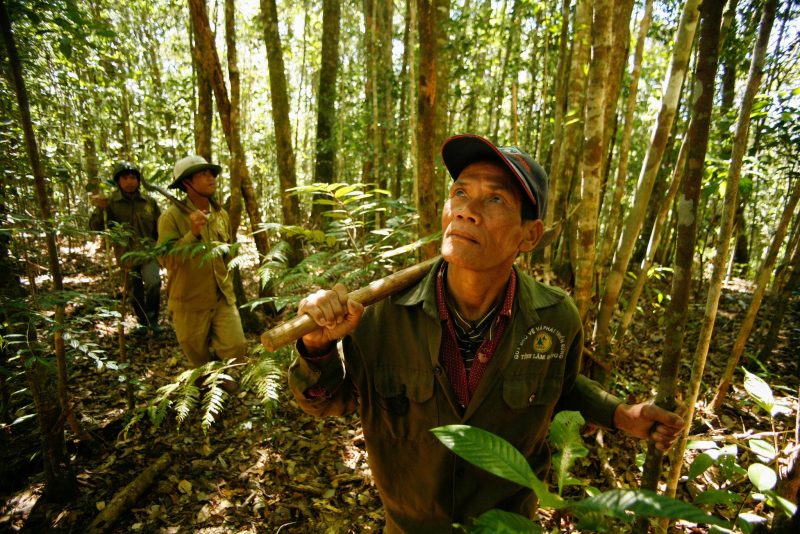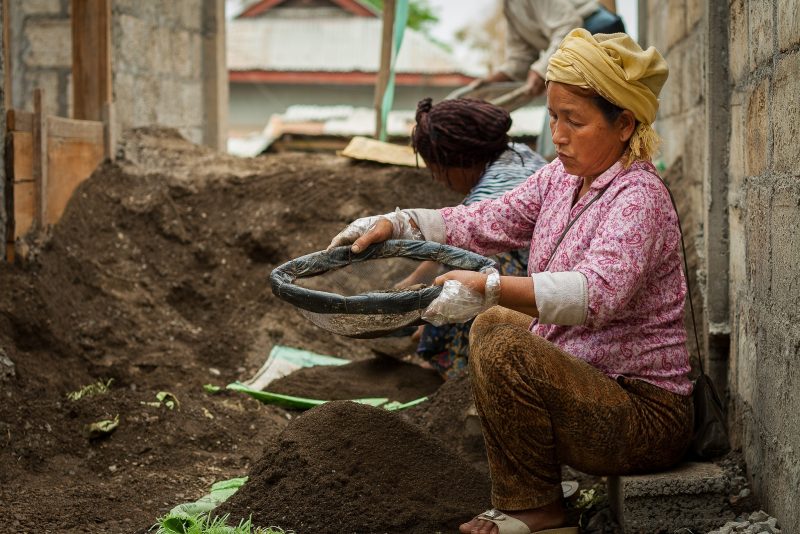Are we sure that ecosystem services alleviate poverty?

But bear with me, and view the issue from a different perspective. One of the more challenging ideas I have read recently is the work by Stefan Dercon, Paul Collier and Douglas Gollin on future trajectories in African agriculture. Their argument is relatively simple. Reducing poverty requires economic growth, this requires raising productivity, and this in turn requires that labour moves out of sectors which are inefficient and unproductive (in terms of value added per capita) to more productive sectors. If the currently poor countries are to become wealthy, then they cannot have such high proportions of their population working in small-scale agriculture or generating minor incomes from natural resource use. Long term strategies to generate wealth require economic transformation.
This reasoning leads the authors to question the focus of development assistance on small-scale farmers and rural livelihoods. They recognize that there is good evidence that poverty is alleviated if these sectors of the economy grow. But they object that development funds may not be most efficiently used on that sector. Investment in rice production, for example, might raise productivity in farmers by 50%, but what if investment in microfinance could support small businesses that raised their productivity by 200%? Given the long term goal of restructuring economies and reallocating labour, should not more attention be given to those sectors which need to grow most?

Nature vs. nurture
The challenges of this thinking to the ESPA programme should be obvious. A great deal of the focus of the programme is about understanding how ecosystem services underpin and secure the livelihoods of the poor. Or it seeks to develop research and decision-making capacity about the links and disconnects between ecosystem services and poverty. It is concerned with exploring new ways in which ecosystem services can add to income streams and empowerment, and reduce risks and vulnerabilities of the poor to global change. For all that it is concerned with ecosystem degradation as an impediment to transformative social change, and despite some notable exceptions (such as the extraordinary modeling by the DELTAS team) it is less concerned with large-scale long term restructuring and transformation of economies.
Equally it is not difficult to argue that advocates of economic growth, whether in policy or academic circles, seem to forget that ecosystem services fundamentally underpin all economic activity. Productive urbanites eat, breathe and drink. They live in coastal zones where sea levels matter. Indeed, much of their leisure and recreation or sense of place depends upon ecosystem health.
There seems then, to be a disconnect between these policy worlds. The mainstream has perennially overlooked environmental issues despite decades of rhetoric to the contrary. On the other hand, members of the ESPA community who focus strongly on ecosystem conservation may sometimes overlook the bigger long term picture.
This is the context which made some of the debate at the ESPA science conference in Nairobi so important. In the afternoon of 17th November a panel considered some of the more profound challenges facing the programme, addressing questions such as: How is equity understood in ecosystem services work? What is the ethical basis for advocating that ecosystem services serve to reduce poverty? How might fairness and equity between the more powerful and less powerful best be achieved? What normative beliefs divide (or unite) the research community which is exploring them and that structure their hopes that attention to ecosystem services might improve prosperity for all.
In part the response of the panel to the challenge of long term restructuring is simply that the future we want has to be built on equity and justice in the present. Future generations might live in restructured economies, but, while we get there, the benefits from ecosystem services need to be fairly distributed.

The role of gender
In this respect Katrina Brown’s work on gender and ecosystem services is vital. Hers’ was a straightforward point but all the more important and challenging for it. Where is the work on how the benefits of ecosystem services are gendered? Men and women will value, use and approach ecosystem services indifferent ways. It was surprising how little work had been done in this area despite its self evident importance. Just futures need to be built on fairer gendered distributions of the benefits from ecosystem services.
Similarly, Kate Schreckenberg asked how might equity and justice in protected area management be effectively advanced in order to implement the ambitious 11th Aichi target to increase equitable protected area management. Her work drew on practical explorations of what this agenda might actually entail on the ground. Again the concern here is that for ecosystem services in protected areas to contribute to human prosperity in the future, these require social relations and governance systems which are built on just and equitable arrangements. This calls for locally-appropriate, negotiated guidelines that may vary from context to context.
The two other contributions presented more philosophical and conceptual perspectives related to the challenge. Janet Fisher was concerned with the ethical basis for ensuring that ecosystem services alleviate poverty. Her work, part of an ESPA blue skies project, examines the philosophical debates as to why ecosystem services impacts on poverty should matter and the ways in which these are operationalized by practitioners. Her work matters because it is in the realm of understanding intergenerational justice that ethically sound policies can be found that will be able to allocate development resources most efficiently.
Finally my own contribution, also from an ESPA blue skies project, explored the epistemic communities who are working on ESPA research. In a sense, if there is a disconnect between concerns for pursuing growth and the ESPA community, then we will be better able to understand how this is produced, by understanding the epistemic groupings which underpin the production of research in this area. This project is mapping social networks producing ESPA work, but is also exploring the normative positions to which people adhere through a think piece and a questionnaire. It is through this project that we might better understand how disconnects are created, and how they might be reconciled.
The transformational challenges posed by Dercon and colleagues are significant. So too are the dangers of forgetting how important ecosystem services will continue to be in radically restructured economies. The challenge facing current ESPA researchers now is how they can communicate better their concerns to the development mainstream – an audience who has not always been good at listening to this sort of interest. The challenge for future iterations of ESPA work is how it might mainstream proper recognition of ecosystem services into transformation and restructuring agendas, while ensuring equity, fairness and justice at all levels – including greater equity between the global North and South.
Dan Brockington, Principal Investigator, Ecosystem Services for Poverty Alleviation
This article has been reposted with permission from the ESPA website. The original piece is available here.
Sources:
Collier, P & Dercon, S. (2014). ‘African Agriculture in 50 Years: Smallholders in a Rapidly Changing World?’ World Development 63: 92–101.
Dercon, S. & Gollin, D. (2014). ‘Agriculture in African Development: Theories and Strategies.’ Annual Review of Resource Economics 6: 471–92.
Ravallion, M., & Chen, S. (2007). ‘China’s (uneven) progress against poverty.’ Journal of Development Economics 82(1): 1–42.
Christiaensen, L., Demery, L., & Kuhl, J. (2011). ‘The (evolving) role of agriculture in poverty reduction – An empirical perspective.’ Journal of Development Economics 96(2): 239–254.
Image credits:
"Manipur (Portfolio)" (CC BY 2.0) by SimpleSkye
"41062-012: Mainstreaming Environment for" (CC BY-NC-ND 2.0) by Asian Development Bank


